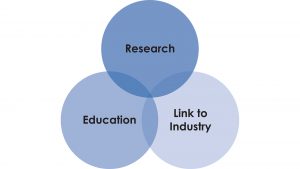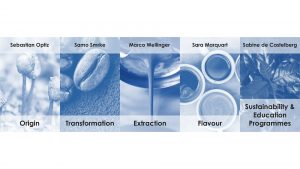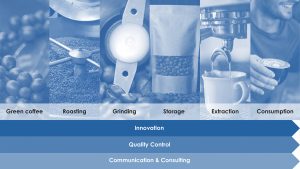The Coffee Excellence Center (CEC) is working towards securing the future of coffee through research, knowledge building and outreach.
Not only does coffee give us moments of sensory enjoyment and multiple grounds for social interactions, it also helps power our day, improve our health and fuel the global economy. In many parts of the world, drinking coffee is part of the daily routine and everyday lifestyle. Coffee production and consumption has been steadily increasing over many decades with a compound annual growth rate (CAGR) over the past 10 years in production and consumption of 2-3%.
- Coffee is part of our and daily routine. It has become a lifestyle product.
- Coffee is a healthy and natural beverage. It does good to us.
- The coffee industry is a robust driver for economic growth for producing and consuming countries.
Besides growth in volume, most impressive has been the growth in value. This has been driven by three factors:
- The rise of the speciality coffee segment;
- The phenomenal increase of single-serve capsule systems; and
- The introduction of concepts such as Q-grading, Cup of Excellence and World Coffee Championships.
Indeed, we are witnessing a transition from volume to value driven growth. In contrast to this positive outlook on the consumption side, risks are appearing on the production side. Production is challenged by high price volatility, low farmer’s income, climate change, pest/diseases, rural depopulation, substitution by more lucrative crops and a very high ecological footprint.
While coffee has long been a low-tech commodity, the situation has evolved over the past 10 years. Both the transition from a volume to a value driven growth on the consumption side and the urgent need for effective strategies to address the risks on the production side will heavily rely on research and innovations. Grow in the coffee sector and securing its future will increasingly depend on investing in research and innovation.
This transformational time for the coffee sector also requires bold and strong responses and initiatives. The most effective action is to advance our insight and mastery of coffee through increased focus on research along the whole value chain. This is the very motivation and driver for the establishment of the Coffee Excellence Center (CEC).
The three vectors of our mission
To translate the vision into practice, the CEC has defined three key vectors on which its mission is based (see Figure 1). Each vector leverages and adds value on the other two through multiple interactions. Together they create a fertile base of learning communities that delivers sustainable innovations through research, technology and education.

- Research leadership: be recognised as the leading academic institution in the generation and dissemination of the science and technology on coffee along the whole value chain. Being involved in projects at every step of the value chain leads to a holistic perspective and actionable results.
- Close linkage to industry and application: the most challenging and rewarding science is one that can be put in practice to sustainably increase the value of the coffee business. This will be accomplished by directly engaging with industry partners, understand their competitive environment and objectives and support their development through research that creates profitable products, technologies and services. In addition to this, the CEC creates research networks and communities of companies with aligned objectives and synergies.
- Educate: develop next generation coffee scientists and technologists who will create innovation and grow in the coffee sector.
Our structure
The CEC’s stated mission is to conduct research along the whole value chain of coffee. Instead of focusing and specialising on a specific aspect of the science and technology of coffee, the CEC has been conducting research on all aspects of the value of coffee. This has on the one hand obvious benefits, such as being involved in projects at every step of the value chain leads to a holistic perspective and actionable results.
Indeed, everything is connected, and quality is dependent on each step along the value chain. To understand how they are connected and interact, to achieve the best results in the cup, is crucial. Yet, this is obviously also a major challenge, as it requires state-of-the art expertise at every step. This is addressed by creating ‘pillars’ with specific responsibilities, led by recognised experts in their fields (see Fig. 2).

This structure and leadership has proven to be a critical success factor. It has enabled a new form of approach to projects and of mutually beneficial communications with partners and stakeholders. Yet, projects are not only classified according to the position along the value chain but also by the type of objective that is pursued. (see Fig. 3).

Fig. 3 Projects along the value chain of coffee. Credit – iStock/focusphotoart/deepblue4you/49pauly/Yurii Sliusar/Nutthaseth Vanchaichana/mihailomilovanovic
The first type of projects are aimed at creating innovations that will lead to profitable and sustainable products, technologies and services, ensuring the long-term prosperity of companies and the coffee sectors. In addition to this, the second type of projects focus on internal quality control and assurance. Indeed, one of the key attributes of quality is consistency in all operation and transformations. Finally, the third type of projects have the objective to characterise and describe existing products and services for benchmarking, communication and marketing purposes.
Each of these types of projects require different approaches, resources and qualifications. They also involve different actors and partners within the collaborating companies and therefore require sensitivities, communication skills and interaction modes that are adapted for the need of the partnering companies. Properly understanding the expectations of the industry partners and responding according to their needs and requests is possibly one of the biggest challenges the CEC has had to master.
The future
The past 10 years have proven that the CEC is responding to a strong need of a growing and flourishing coffee industry. Today the CEC is working on collaborative projects with mostly large and multinational companies, but also with local SME and start-ups. In this process, we also take the role of consultants and partners in helping formulate and crystalise strategies and pipelines. Our involvement and deep knowledge of a large number of key actors of different sectors puts us in the unique position of overseeing and understanding both trends and opportunities.
About the Founder and Head of the CEC: Chahan Yeretzian
- Professor for Analytical Chemistry, Bioanalytical Chemistry and Diagnostics;
- Head of Coffee Excellence Center (CEC);
- Head of Analytical Technologies;
- Board member of Swiss SCAE/SCA Chapter;
- Board member of ASIC (Association for the Science and Information on Coffee);
- Advisory board of ‘Atomo Coffee’ and ‘Sudden Coffee’;
- CEO Swiss Coffee Alliance GmbH;
- Chair of SCA Coffee Science Advisory Board to the Coffee Science Foundation;
- 2015-2016: Director on Board of SCAE (Specialty Coffee Association of Europe) & Chair of Research Advisory Council;
- 2017-2018: Director on Board of SCA (Specialty Coffee Association) & Chair of Research Advisory Council; and
- 2017-2019: Advisory Board of German Museum in Munich for the special exhibition ‘Kosmos Kaffee’.
Yeretzian is a Swiss of Armenian origin, born and raised in Aleppo, Syria. After the Six-Day War in 1967, his family immigrated to Berne in Switzerland. The seven-year-old Chahan spoke Arabic, Armenian and French and has always felt as a world citizen.
Yeretzian came to study chemistry by chance, and even today, he still describes his job occupation in an unconventional way: “I may be a chemist, but I don’t feel only like being a chemist”. He is interested in natural sciences in general, in rational thinking and procedure. He chose chemistry because it plays a central role in all scientific disciplines.
After completing his doctorate in physical chemistry at the University of Bern, Yeretzian studied as a post-doctoral student at the University of California in Los Angeles (UCLA), conducting research on fullerenes and new nanostructured materials made of carbon atoms. During that time, he also attracted attention with numerous publications in renowned trade journals, such as in Nature and Science. He then was awarded a two-year Alexander von Humboldt Fellowship at the Technical University of Munich, where he conducted research on high-resolution laser spectroscopy.
In 1996, Yeretzian moved from academia to industry and held various management positions at Nestlé and Nespresso in Switzerland, the USA and Germany between 1996 and 2007. From the first day on and during most of his career at Nestlé, his focus was on coffee. He became acquainted with the entire value-added chain. He also completed a Master of Business Administration (MBA) from the University of Lausanne and became increasingly involved in management at Nestlé, distancing himself from research. However, his passion for the sciences remained intact.
This dream eventually came true in 2008. Yeretzian applied for a position at the chemistry institute of the Zurich University of Applied Sciences (ZHAW) and made it clear in the introductory round that he wanted to develop a research center on coffee and set up post-graduate programs on coffee. This was welcomed by the University and he started his position on January 2008. The post-graduate course ‘The Science and Art of Coffee’, which he started in 2010, is the first of its kind at a Swiss university and internationally unique. The part-time course is aimed at academics and practitioners, lasts nine months and covers the entire coffee cosmos from genetics, cultivation, chemistry, sensory sciences, technology and trading to questions of sustainability and recycling. Yeretzian has made the ZHAW CEC a world leader in coffee research.
Prof Dr MBA Chahan Yeretzian
Head and Founder
Coffee Excellence Center
Zurich University of Applied Sciences (ZHAW)
+41 (0) 58 934 55 26
chahan.yeretzian@zhaw.ch
www.zhaw.ch/en/lsfm/institutes-centres/icbt/analytical-chemistry/analytical-technologies/coffee-excellence-center/
Please note, this article will feature in the March 2020 issue of our publication.







